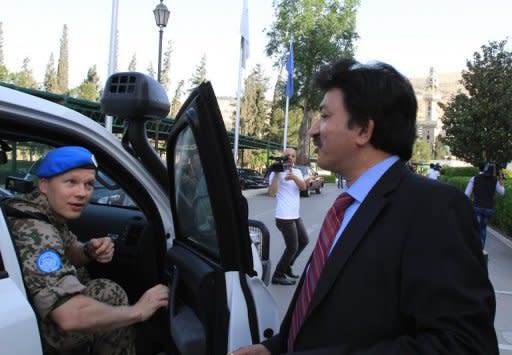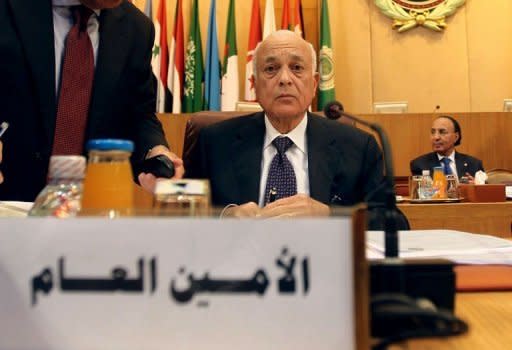UN leader says Syria 'in contravention' of peace plan
UN leader Ban Ki-moon said the Syrian government is "in contravention" of an agreed peace plan by keeping troops and heavy weapons in cities. Ban also said he was "gravely alarmed" by reports of shelling of populated areas in Syria, in a statement released after the death of scores of people in a massive explosion in the protest city of Hama. Activists blamed the regime and put the death toll at 68, including 16 children, while Syrian state media said 16 were killed when a bomb that "terrorists" were building exploded prematurely inside a house. More than 9,000 people have died since a revolt erupted against President Bashar al-Assad's regime in March last year, the United Nations says, while non-government groups put the figure at more than 11,100. Under strong international pressure, Assad's government has agreed a troop withdrawal from cities as part of a six-point peace plan for Syria agreed with UN-Arab League envoy Kofi Annan. The truce, which officially started on April 12 but has barely held, is to be monitored by 300 UN observers due to arrive in Syria in coming weeks. A small advance team is already on the ground. Ban "remains deeply troubled by the continued presence of heavy weapons, military equipment and army personnel in population centers, as reported by United Nations Military Observers," said the UN statement. This was "in contravention of the Syrian government's commitments to withdraw its troops and heavy weapons from these areas," said Ban, demanding that Assad's government "comply with its commitments without delay." Western nations have expressed strong doubts that the UN observers will be able to work. The United States has already warned it may not renew the mission's initial three month mandate. US ambassador to the UN Susan Rice said the Security Council must be ready to order sanctions if Syria flouts commitments to halt violence. "We condemn what remains the government's refusal to abide by its commitments, its continued intense use of heavy weaponry in Hama and elsewhere, which continues to result in large numbers of civilian deaths every day," she told reporters. Syria's main opposition group the Syrian National Congress said: "We are calling for an emergency meeting of the UN Security Council so that it can issue a resolution to protect civilians in Syria. "Hama in recent days, and following a visit by UN observers, witnessed a series of crimes... that left more than 100 people dead and hundreds wounded because of heavy shelling," it said in a statement. In recent violence, at least 40 people were also reportedly killed in Hama on Monday, including nine activists "summarily executed" after meeting UN monitors, a rights group said. The reports cannot be verified because of restrictions on foreign media. The Arab League said in a statement Thursday it would ask the UN to ensure the immediate protection of civilians in Syria, without however going as far as demanding the use of force. Arab League Secretary General Nabil al-Arabi called for observers to be deployed rapidly. "The entire world is waiting for a truce and the observers to be deployed, but unfortunately the fighting has not stopped and every day new victims die," he told a league ministerial meeting in Cairo. "The important thing now is the ceasefire, and this will only happen if a sufficient number of observers is deployed." On Wednesday, France raised the prospect of military intervention if Annan's peace plan fails. Foreign Minister Alain Juppe said the international community would have to move to a Chapter Seven resolution, which authorises foreign powers to take measures including military options. However, Juppe added that such a resolution, which was also mooted by US Secretary of State Hillary Clinton last week, was unlikely to pass, alluding to previous Security Council vetoes by Russia and China. Moscow, a long-time Damascus ally, blamed the recent violence in Hama on rebel forces and hinted at Al-Qaeda involvement. "Opposition groups have essentially reverted to waging wide-scale terror in the region," said foreign ministry spokesman Alexander Lukashevich. Attacks aimed at "killing as many peaceful civilians as possible and destroying civilian infrastructure remind one of what is happening in Iraq, Jordan and other places where Al-Qaeda and its groups operate," he said.



